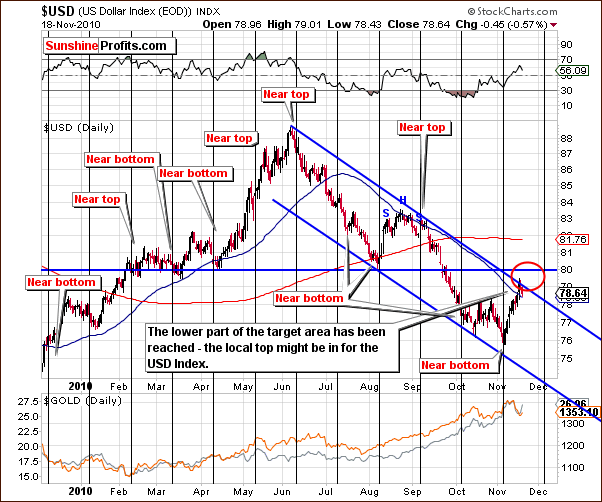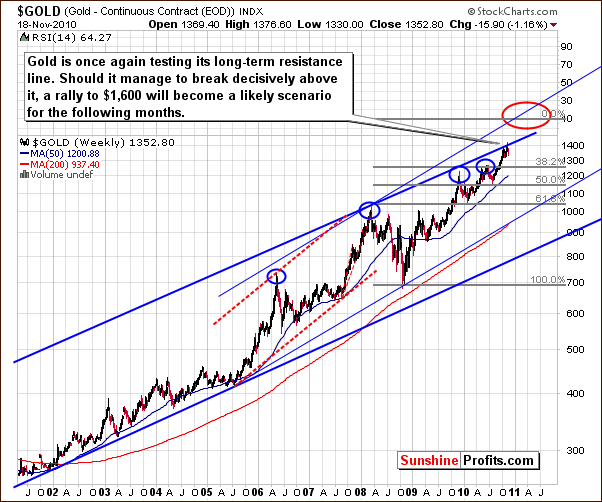Gold, Weaker Dollar, and US Exports
Commodities / Gold and Silver 2010 Nov 23, 2010 - 05:10 AM GMTBy: Rosanne_Lim
 With the Chinese yuan and Brazilian reals off-limits to most retail investors, turning to gold may be the best bet. Even with the gold hitting the $1,400 an ounce mark, it’s still a good idea to allocate around 20% of your portfolio to this precious metal. Consider that over the last decade, gold is up by 17%. Compare this to stocks over the same period and you’ll see the difference. Stocks were up by only 1%.
With the Chinese yuan and Brazilian reals off-limits to most retail investors, turning to gold may be the best bet. Even with the gold hitting the $1,400 an ounce mark, it’s still a good idea to allocate around 20% of your portfolio to this precious metal. Consider that over the last decade, gold is up by 17%. Compare this to stocks over the same period and you’ll see the difference. Stocks were up by only 1%.
In today’s economic climate, gold can serve as a hedge against a weakening dollar. Also, unlike other commodities like wood, wheat, and aluminum that are lumped with gold, you can easily convert this precious metal into cash. Its growing popularity around the world also makes it a safe bet over the short and medium term. China, which is the world’s biggest producer of gold, is quietly buying up more of it.
The Chinese emerging middle class are also quietly acquiring their own stash of gold. India’s middle class is doing the same thing. But the latter is more into buying gold jewelry than bullions.
Dollar Set to Get Weaker, But to What End?
A weak currency would traditionally help a country improve its exports, thereby creating more investments and jobs. However, in the case of the United States today, a weak dollar won’t necessary make much of a difference. It will help the export industry to a certain degree but not to the extent it did in the past – mainly because of how American multinational firms are operating.
Determining the impact of a weak dollar is important. If it isn’t as useful as policymakers hoped it would, then the United States might be getting criticisms left and right for (monetary easing announced this month) without deriving actual benefits from it. A depressed dollar provides American exporters with an advantage; it should also ideally improve the unemployment rate which is stubbornly at 9.6%.
Both President Obama and Treasury Secretary Tim Geithner emphasized that monetary easing is designed to help American businesses invest, grow, and borrow rather than a move that’s intended to lower the dollar. A lower dollar is just among its effects. Even if the Fed’s decision does weaken the currency, however, America’s jobless may not reap the benefits.
Job Creation is Not a Sure Thing
The real issue may lie on how most American companies are structured. Large US firms from General Electric to Ford often manufacturing products in the countries where they will be sold, rather than exporting them abroad. Since companies are effectively using only one currency in this process, this takes the dollar out of the equation.
And for companies that still manufacture in the United States, majority of them source components from abroad. The weaker dollar is thus offset by the higher cost of sourcing supplies. In addition, even if a company receives a boost in foreign sales, it may not result to employment. It is important to note that a large chunk of American exports are manufactured products, which are not labor-intensive.
Martin Regalia, the chief economist of the United States Chamber of Commerce says it clearly, “There are very few corporations that would see this just one way…it cuts across a whole bunch of lines”. Overall, the effect on net export will be positive.
Profitability for companies won’t easily become a driver for job creation. A lot of firms that are currently manufacturing in the US are usually too small to justify setting up an overseas facility. Having a weak dollar will help but it won’t prompt them to hire especially if economic outlook remains unclear. Daniel Meckstroth, the chief economist of Manufacturers Alliance further says that, “you can replace people with machines.”
Data from the past are not very encouraging. The dollar has fallen by 31% against major currencies since 2001. Yet, Nigel Gault of HIS Global Insight said that manufacturing employment actually went down from 16.4 million to 11.7 million – this is despite the fact that exports actually grew by 45%. Since June 2010, the dollar has already fallen 10% against a basket of major currencies and exports are up 0.3% in September, the highest level in two years.

The long-term USD chart (courtesy of http://stockcharts.com) above shows that the index values reached the lower part of our target eclipse. It is relatively safe to say that betting on the USD at this point would no longer yield significant profits. In the chart above, note that the USD is not yet close to the next cyclical turning point so it will trade more or less on the 80 level before declining again - still, we wouldn't bet on its gains in the near future as the risk/reward ratio doesn't appear favorable here.
Gary Hafbauer from the Peterson Institute for International Economics expects the dollar to fall another 10% in the next few months. This would result to an estimated $100 billion in American experts over the next two years – translating to about 500,000. The number isn’t bad but it is hardly enough to create an impact because 15 million people are still without work.
The dollar has indeed been driven down. However, the Fed’s decision to inject $600 billion into the economy is not likely to result to steep devaluation because most of the weakening already occurred prior to the announcement.
Now let’s turn to gold. The price of gold went back to around $1,350 an ounce on Thursday even as the dollar continued to decline. Silver prices rose by nearly 4%, reaching $26.60 an ounce.

In the very long-term chart this week, we see that gold has not moved above the upper border of the very long-term trading channel. As we have stated in previous essays, this is an important resistance level. It was likely that some consolidation will be seen in the near-term so this should not be of any great concern as it is quite a natural phenomenon.
The important point is that our next target level, after moving above the trading channel will be close to $1,600. This target has been arrived at by utilizing two important technical tools. One is the upper border of the accelerated trading channel and the second is extrapolation made my applying the 1.618 phi (φ) number. Both tools indicate a likely move to the $1,600 level perhaps in the first quarter of 2011. Please note that the full version of this essay includes also short-term details.
Trade Imbalance
Experience dictates that the trade imbalance, which we talked about in a previous article, between surplus and deficit countries won’t easily be solved by currency movements in itself.
This was already apparent in the 1980s; the weakening dollar couldn’t solve United State’s deficit with Japan. The same can be said when you look at another trading partner, Britain. Roger Sustar, the president of Fredon Corporation which is a maker of components in the defense, aerospace, and medical industries, said that even as the dollar weakened against the pound, their company didn’t see an increase in sales. Rather, the company received a deluge of requests from clients asking them to lower their prices.
Despite the challenges, there are still a number of economists who are hopeful that a sustained weakness of the dollar will have a positive effect on US employment. Increase in exports, if continual, would have a multiplier effect on the economy. Steve Blitz from ITG Investment Research said that the country should rely more on the export industry to improve employment outlook rather than relying on US consumers (which currently accounts for 60% of national economic activity). He added that, “the model of the last 30 years can no longer continue…the job creation has to come from the export sector.”
Foreign investment into the US can also generate jobs. For example, BMW has set up several facilities in the country to avoid getting hit by currency fluctuations. The government can encourage more multinational companies to set up their facilities within the country by offering special advances. Currency movements are just one part of the system.
If you are interested in knowing more on the market signals we analyze, we encourage you to subscribe to our Premium Updates to read the latest trading suggestions. We also have a free mailing list - if you sing up today, you'll get 7 days of full access to our website absolutely free. In other words, there's no risk, and you can unsubscribe anytime.
Thank you for reading.
Thank you for reading.
Rosanne Lim
Sunshine Profits Contributing Author
Interested in increasing your profits in the PM sector? Want to know which stocks to buy? Would you like to improve your risk/reward ratio?
Sunshine Profits provides professional support for precious metals Investors and Traders.
Apart from weekly Premium Updates and quick Market Alerts, members of the Sunshine Profits’ Premium Service gain access to Charts, Tools and Key Principles sections. Click the following link to find out how many benefits this means to you. Naturally, you may browse the sample version and easily sing-up for a free trial to see if the Premium Service meets your expectations.
All essays, research and information found above represent analyses and opinions of Mr. Radomski and Sunshine Profits' associates only. As such, it may prove wrong and be a subject to change without notice. Opinions and analyses were based on data available to authors of respective essays at the time of writing. Although the information provided above is based on careful research and sources that are believed to be accurate, Mr. Radomski and his associates do not guarantee the accuracy or thoroughness of the data or information reported. The opinions published above belong to Mr. Radomski or respective associates and are neither an offer nor a recommendation to purchase or sell securities. Mr. Radomski is not a Registered Securities Advisor. Mr. Radomski does not recommend services, products, business or investment in any company mentioned in any of his essays or reports. Materials published above have been prepared for your private use and their sole purpose is to educate readers about various investments.
By reading Mr. Radomski's essays or reports you fully agree that he will not be held responsible or liable for any decisions you make regarding any information provided in these essays or reports. Investing, trading and speculation in any financial markets may involve high risk of loss. We strongly advise that you consult a certified investment advisor and we encourage you to do your own research before making any investment decision. Mr. Radomski, Sunshine Profits' employees and affiliates as well as members of their families may have a short or long position in any securities, including those mentioned in any of the reports or essays, and may make additional purchases and/or sales of those securities without notice.
© 2005-2022 http://www.MarketOracle.co.uk - The Market Oracle is a FREE Daily Financial Markets Analysis & Forecasting online publication.



